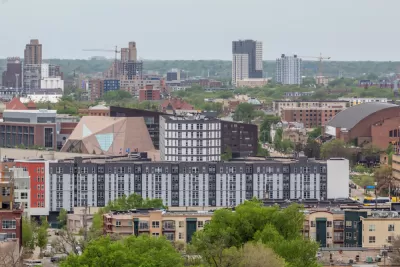Minneapolis joins the avant garde of cities implementing a dramatic overhaul of the parking requirement status quo that has been a primary determinant of the form and function of cities for nearly a century.

"The Minneapolis City Council voted unanimously Friday to eliminate minimum parking requirements on new developments citywide," reports Zoë Jackson.
The new citywide parking requirements are set to take effect this week after the 13-0 by the City Council. The change also "makes Minneapolis the largest Midwest city to abandon parking requirements and one of just a handful in the United States," adds Jackson.
In addition to removing parking requirements for new development citywide, the ordinance "also includes an increase in bicycle parking requirements and will add new travel demand management (TDM) strategy requirements to more buildings, including every residential building with 50 or more units."
Jackson notes that although parking requirements have been eliminated, developers still have the choice to build parking with new developments, just with more flexibility.
City Council President Lisa Bender offers a soundbite in the article that ties the parking reform vote to climate and emissions goals set by the Minneapolis 2040 Comprehensive Plan. As for the advocacy that helped bring this historic moment to fruition, Jackson provides this anecdote:
Minneapolis Planning Commissioner Chris Meyer has been pushing for the elimination of parking requirements since he was a student at the University of Minnesota in 2011. In 2015, he bought 13 copies of "The High Cost of Free Parking" by Donald Shoup for each council member. Later that year, minimums near transit were eliminated.
Minneapolis is in the lead in the parking reform movement in the Midwest, but several other U.S. cities have already removed parking requirements, like Buffalo, San Diego, and San Francisco. Houston and Los Angeles removed parking requirements in specific neighborhoods. Nearby St. Paul is in earlier stages of reconsidering the parking requirements in its zoning code, as detailed in a Planetizen post from earlier this month. Other cities around the country are at various stages of the process of removing some or all parking requirements, including Berkeley, Dallas, Seattle, and Raleigh, among others.
FULL STORY: Minneapolis City Council unanimously eliminates parking requirements

Trump Administration Could Effectively End Housing Voucher Program
Federal officials are eyeing major cuts to the Section 8 program that helps millions of low-income households pay rent.

Planetizen Federal Action Tracker
A weekly monitor of how Trump’s orders and actions are impacting planners and planning in America.

Ken Jennings Launches Transit Web Series
The Jeopardy champ wants you to ride public transit.

Driving Equity and Clean Air: California Invests in Greener School Transportation
California has awarded $500 million to fund 1,000 zero-emission school buses and chargers for educational agencies as part of its effort to reduce pollution, improve student health, and accelerate the transition to clean transportation.

Congress Moves to End Reconnecting Communities and Related Grants
The House Transportation and Infrastructure Committee moved to rescind funding for the Neighborhood Equity and Access program, which funds highway removals, freeway caps, transit projects, pedestrian infrastructure, and more.

From Throughway to Public Space: Taking Back the American Street
How the Covid-19 pandemic taught us new ways to reclaim city streets from cars.
Urban Design for Planners 1: Software Tools
This six-course series explores essential urban design concepts using open source software and equips planners with the tools they need to participate fully in the urban design process.
Planning for Universal Design
Learn the tools for implementing Universal Design in planning regulations.
Heyer Gruel & Associates PA
Ada County Highway District
Institute for Housing and Urban Development Studies (IHS)
City of Grandview
Harvard GSD Executive Education
Toledo-Lucas County Plan Commissions
Salt Lake City
NYU Wagner Graduate School of Public Service





























